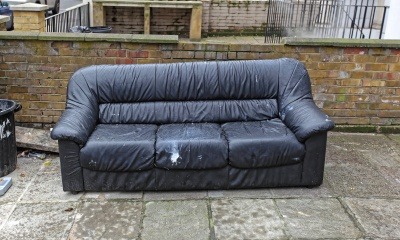Environment Agency POPs enforcement stops council sofa collections
Councils have temporarily halted their collection of soft furnishings, mostly upholstered seating items. Cumbria, Cambridgeshire and the Isle of Wight have all paused operations and told residents to keep hold of these bulky waste items until alternative disposal routes, away from landfill, have been established.
 A Cumbria County Council spokesperson told Resource: “We are working with our contractors to find alternative arrangements for this waste type which is compliant with the new legislation. We expect to have new arrangements in place by the end of January.”
A Cumbria County Council spokesperson told Resource: “We are working with our contractors to find alternative arrangements for this waste type which is compliant with the new legislation. We expect to have new arrangements in place by the end of January.”
Items affected include sofas and armchairs, sofa beds and futons, kitchen and dining room chairs, stools and foot stools, home office chairs, bean bags, and floor or sofa cushions.
In August the Environment Agency (EA) announced new bans on upholstered seating items being reused or going to landfill, instead having to be incinerated. The final guidelines were released in December 2022.
This followed an investigation which found that large levels of persistent organic pollutants (POPs) can be found in seating textiles and foams which ‘remain intact in the environment for long periods’ and ‘become widely distributed geographically’, according to the EA.
The new regulations do not change the legal requirement to apply for an environmental permit to temporarily store waste upholstered domestic seating.
POPs refer to organic compounds which the European Commission defines as a group that ‘have toxic properties, persist in the environment, accumulate in food chains and pose a risk to human health and the environment’.
This includes pesticides such as dichlorodiphenyltrichloroethane (DDT), industrial chemicals such as polychlorinated biphenyls and terphenyls (PCBs/PCTs), and unintentional by-products of industrial processes, for example dioxins and furans. Items such as sofas often contain polybrominated diphenyl ethers.
The new guidelines have the potential to place strain on councils which do not have access to the necessary infrastructure to handle the incineration of bulky POPs items.
The Cumbria spokesperson continued: “Given the very short notice of the new legislation, it did not leave enough time for the council to make necessary arrangements with our contractors so we have had no choice but to temporarily suspend the depositing of this waste material at our HWRC sites.
“We of course support the legislation that anything that is a pollutant to the environment needs to be treated and disposed of appropriately – our frustrations are with the rapid implementation of the enforcement of the legislation which was contrary to indications previously given by Defra and the Environment Agency to Local Authorities.”
Cumbria’s Cabinet Member for Environment, Councillor Celia Tibble, said: “This rapid implementation was unexpected and contrary to indications previously given by DEFRA and the Environment Agency to Local Authorities.
“There is insufficient time to make the necessary changes to how this type of waste is handled at our Household Waste Recycling Centres and as a result, with effect from 1 January 2023, we will temporarily be unable to accept these items at our HWRCs.
“This is frustrating and unwelcome news, and we are working hard to find a longer-term solution as quickly as possible.
“We kindly ask residents looking to dispose of household items such as these to either visit their local Household Waste Recycling Centre before January 1, 2023, or remain patient and hold onto any of these items until such time we’re able to accept them again.
Industry and council concerns
Councils, committees and associations have also cited confusion over the proposed implementation date for legislation, which was announced in August and was originally said to come into force on 1 January 2023. It was later stated that inspections would only begin in August 2023, and that 1 January was simply a registration date. Other councils have claimed the implementation date was confirmed in December to be 1 January 2023, giving them only one month to prepare.
Concerns over an increase in fly-tipping due to the paused collections have also been raised, but the Cumbria County Council spokesperson told Resource: “Thankfully we haven’t seen an increase in fly-tipping and we have been clear in our public messaging that fly-tipping is a serious criminal offence for which people can be prosecuted.
“We also advise people to check permits and waste carrier registrations for anyone who is using a private waste collection company to dispose of their old seating to ensure it is handled and disposed of in line with legal requirements.”
The Local Authority Recycling Advisory Committee (LARAC) previously expressed serious concerns over the new guidance. In October it released the results of a survey which showed a third of its local authority members will be affected by the change and expect it to cause a ’major disruption to collection systems and their engagement with residents’.
Over a quarter of respondents said they felt the only way to comply with the guidelines would be to operate two separate collections for POPs and non-POPs items.
LARAC stated that none of the respondents saw positive changes in the new requirements and 55 per cent believed the would not be in a space to comply to the new rules by the end of 2022.
Preparations for the new guidelines include extra skips at HWRCs, the cost of modifying transfer stations for the separate depositing of POPs waste, and particulate control in compaction activities.
In November 2022, the Local Government Association (LGA) warned of a lack of infrastructure to handle the new POPs collections.
Defra has commissioned research into the effect the new POPs regulations will have on councils.






